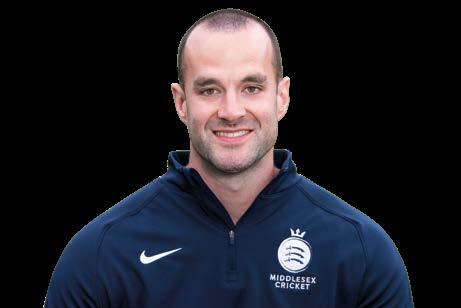
3 minute read
Nutrition
Fuelling for success

JONTY NORRIS, HEAD OF STRENGTH AND CONDITIONING AT DERBYSHIRE CCC, SHARES HIS NUTRITION TIPS TO HELP YOU PERFORM THROUGHOUT THE SEASON
WHAT’S THE BEST WAY TO GET IN SHAPE FOR THE SEASON?
Try not to do too much, too quickly. Sustainability is key. Diets and meal replacements are short-term fixes. You want to think, “how can I stay as healthy as possible for as long as possible?” If you have to do it five days a week, every week it has to be something you can stick to.
Be honest with your intake. People go on low-calorie diets, feel lethargic and fall off the wagon. You might only need a 10 per cent reduction in intake to make a positive change but if you don’t know your intake, you can’t make the right change.
IT’S MATCHDAY... HOW SHOULD I BE FUELLING?
It’s important to avoid the post-tea slump.
If you smash tea, you’re digesting for the next two hours and it has a negative impact on your fielding performance. Try to eat smaller amounts at regular intervals. Focus on carbohydrates – cereal bars are good for your kitbag.
Staying hydrated is essential. Try to get through a litre of water. If it’s hot, think about replacing your salts – whether it’s a hydration product or table salt in squash.
Post-match, get some carbs and protein in to start your recovery before you hit the bar.
DINE LIKE A LORD
HOW DO YOU MANAGE THE DIET OF A PROFESSIONAL CRICKETER?
One of the key principles is fuelling for the work that is required. If you’re under-fuelled, you’re not going to perform.
However, it’s also important on lighter days to manage your intake. Just because you’ve trained loads one day doesn’t mean you can eat loads on your day off.
This can also vary with your match performance, particularly for batters. You might score two centuries one match and under 10 the next which is a big change in workload.
The other key is protein intake. It’s important for recovery and building muscle, or if we’re trying to manage energy intake for weight or body fat loss, protein is good for feeling fuller. It can be from a variety of sources like chicken, fish, eggs, dairy products, beans, pulses and vegetarian substitutes. It’s not just chicken, broccoli and rice every day.
WHAT ARE THE DIFFERENCES FOR A CLUB PLAYER?
Professionals have to think about whether it’s a Championship game or a one-day match because of the variation in workload. A club player, by contrast, has to be consistent through the week and then fuel on game day.
Pros can get away with eating more, because they do more activity. A club player’s expenditure is low except on game day, so you have to stay disciplined during the week.
At the weekend it’s about making sure you’re ready to go and doing good recovery before getting back into the routine. Andy Mitchell, head of strength and conditioning at Middlesex, reveals what the pros eat during a day at Lord’s
BREAKFAST
We encourage the players to eat breakfast at home, but we have cereals, bagels, bread, eggs etc available for a second breakfast!
LUNCH
Lord’s lunches are the stuff of legend. There’s usually a soup starter followed by four different mains: veggie, fish, meat and pasta. There’s always a dessert too but it’s hard to bowl 20 overs after a crème brûlee.
TEA
A quick snack full of good, but light, calories: wraps, sandwiches, fruitbased flapjacks or muffins, smoothies, fruit, nuts, energy gels and protein shakes.
SNACKS
There’s always fruit, nuts, snacks, biltong and supplements in the dressing rooms, and there are cool bags on the boundary filled with an electrolyte drink, bananas and some energy gels to help the bowlers fuel.







